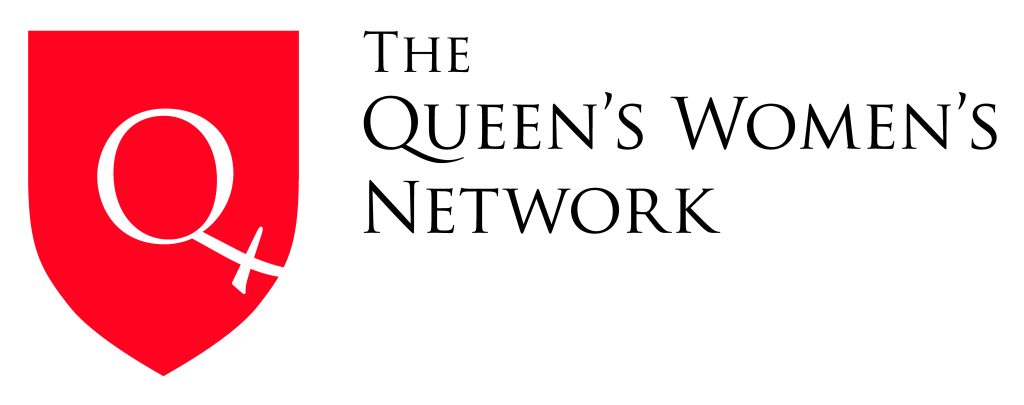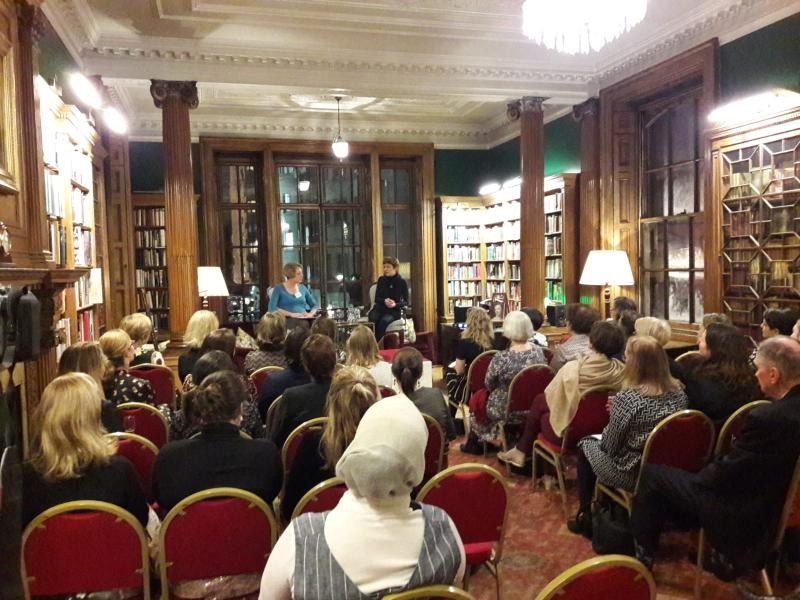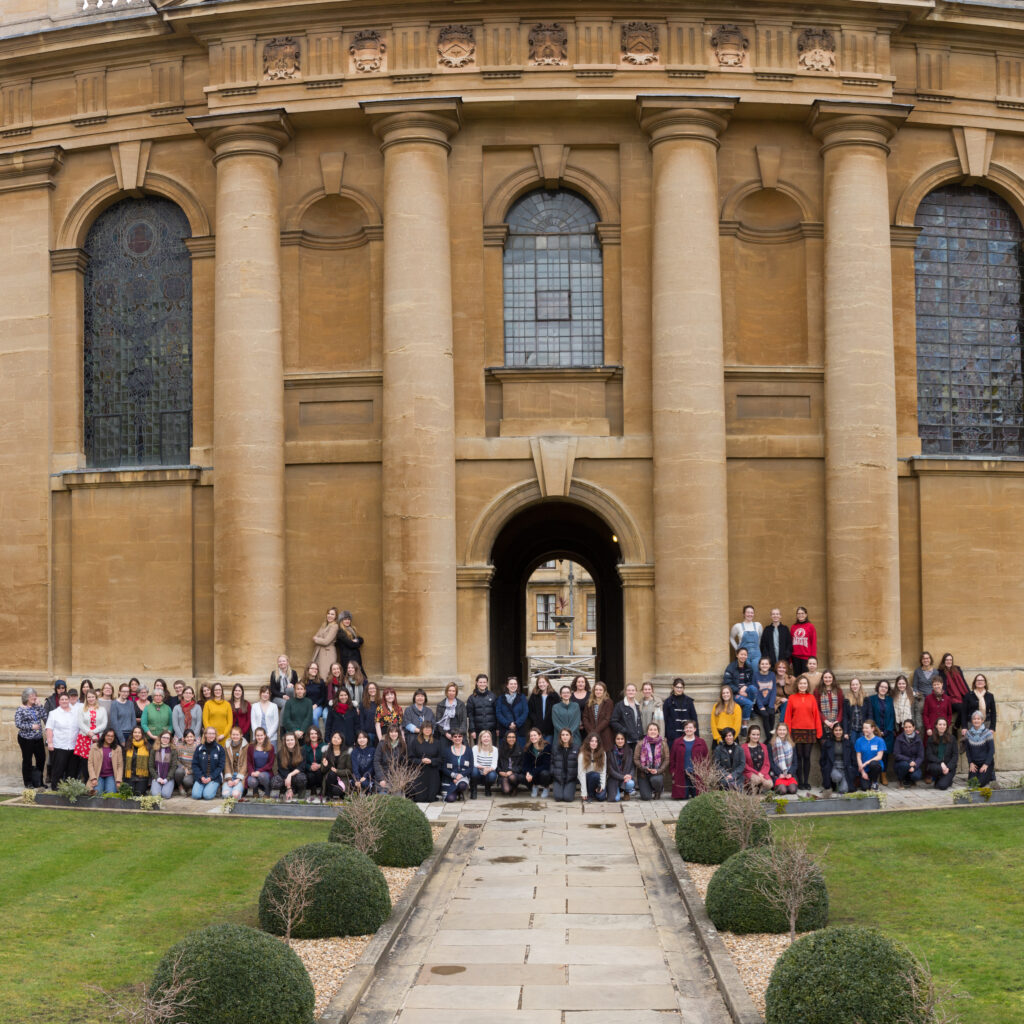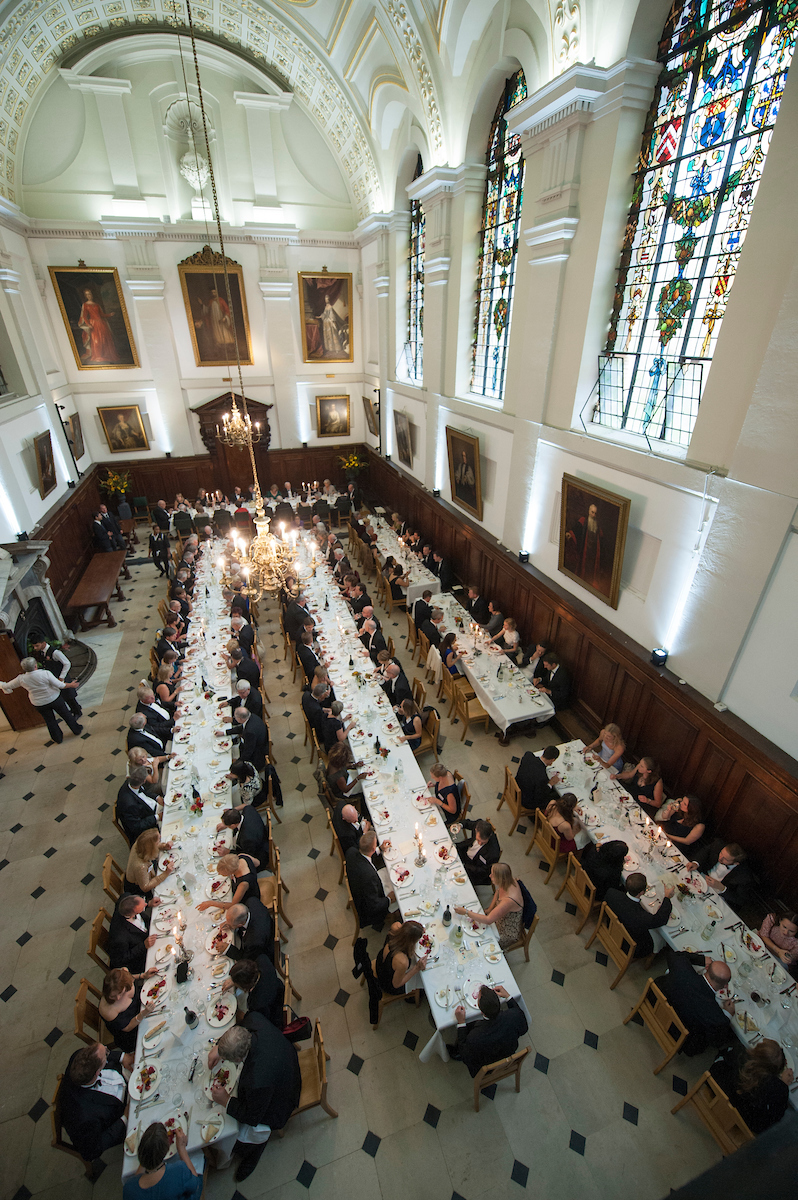The Queen’s Women’s Network (QWN) launched on International Women’s Day 2018 to celebrate the admission of women in 1979 and to create a lasting legacy for future Queenswomen.
The QWN is led by a community of Queen’s alumnae, working with the support of the College. Today the Network provides professional and social networking opportunities for current and Old Members. It helps everyone, within and across the generations, to celebrate success, promote equality and inclusion and champions change.
Please join our network via our LinkedIn group. We look forward to your involvement in events, initiatives and exchanging insights.

To ensure our exciting programme of activities can continue to thrive in the years to come, the QWN is looking for alumnae volunteers to support in the following areas, with flexible opportunities to suit your availability:
- organising QWN events
- proposing a venue to host panel talks
- writing about the network’s activities in College communication
- suggesting event speakers, or volunteering yourself
- networking and giving advice to current students
If you would like to get involved, or can offer your help in any way, please contact : qwnetworkcontact@gmail.com
Queenswomen from all four decades joined with the College to create a series of events and initiatives throughout 2018-2020 that celebrated the admission of women in 1979 and created a lasting legacy for future Queenswomen.
In addition to today’s thriving Network, there were three creative outcomes from the anniversary celebrations:
QWN events
The QWN hosts regular events both on-line and in-person, engaging in discussion on challenges and opportunities facing current and Old Members. All members of the Queen’s Community are welcome to attend.

The Queen’s Women’s Network in London 2025: “Navigating change and making it happen” (audio only)
On 27 March 2025, the Queen’s Women’s Network held their annual event to mark International Women’s Day. Six panellists came together at St Ethelburga’s Centre for Reconciliation and Peace in London to share their experiences with change in their lives and careers. You can hear an audio recording of the panel discussion hereOn 27 March 2025, the Queen’s Women’s Network held their annual event to mark International Women’s Day. Six panellists came together at St Ethelburga’s Centre for Reconciliation and Peace in London to share their experiences with change in their lives and careers. You can hear an audio recording of the panel discussion below.
The Queen’s Women’s Network in London 2023: “Changing Paths” (audio only)
We were delighted to return to in-person networking for our London event on 2 March 2023: ‘Changing paths: experiences of different career journeys’.
Old Members Katherine Irving (Chemistry, 1984), Francine Raveney (English and Modern Languages, 1992) and Joanne Robinson (History, 1991) shared their fascinating, entertaining and inspiring career journeys, reflecting on what had influenced their changes of direction in life.
The evening was kindly hosted by RSM UK Ltd: many thanks to Mark Evans (Modern Languages, 1977) for facilitating this and to Lauriane Anderson Mair (Modern Languages, 2007) for chairing.
The Queen’ Women’s Network online 2022: “Going with the Flow”
On 27 September 2022, we held an online event with three excellent expert speakers on the wide-ranging impacts of women’s health in the workplace, which provided useful insights alongside practical advice.
The Queen’s Women’s Network: Women in Finance
In October 2021, the Queen’s Women’s Network held its first ‘hybrid’ event with a live audience in the Shulman Theatre in the College and live-streaming to Old Members around the world. Introduced by the Provost and co-hosted by Elizabeth Pilkington (Mathematics, 2000) and Jane Welsh (PPE, 1979) from the Queen’s Women’s Network, the panel comprised Rebecca Emerson (Economics, 1992) and Paola Binns (Modern History and Modern Languages, 1980).
After a quick overview of the breadth of the Finance industry and the state of diversity in it, the panellists shared their career histories and advice around how to get into the industry. We had lots of questions from both the live audience and from those listening online and from the discussions that continued over drinks afterwards.
The Queen’s Women’s Network: How volunteering can support career progression
What to do when a pandemic strikes and all face-to-face gatherings are banned? The women of the Network are a resilient group and worked around the issue to hold the planned event in a safe way. We had originally planned to hold this in London but the Covid pandemic and subsequent lock down meant that our plans had to change and we decided to meet instead on Zoom. This was the first online session held by the Network.
Many women in their working lives can struggle to get the skills and experiences they need to progress their careers. Experiences they are offered in the workplace can be high risk and subject to scrutiny by colleagues. However, there are opportunities to gain these skills in safe, supportive environments. Jane Macaulay and Alison Sanders (PPE, 1979) talked about their varied experiences volunteering for a number of organisations and reflected on how this developed a range of skills and knowledge that they were able to then go on to use in their life and careers.
Volunteering had not only enabled them to give something back to their local communities but also helped them to learn and practise new skills in a variety of settings supported by voluntary organisations.
Both Jane, who was Chair of the Surrey Magistrates Bench, and Alison, a relatively new magistrate, talked about their experiences in the law courts as a magistrate. Few people know that the role of magistrate is a voluntary one. As a member of the judiciary, magistrates receive significant training and support to fulfil their duties. Through this they can develop a wide range of transferrable skills; team work, communication and judgement. Jane and Alison also reflected on other voluntary roles they had undertaken which can support career development such as charity trustee, school governor, mentor and non-executive director. These roles can provide experience in managing finance and employment issues as well as developing chairing skills.
The key message from the session was that volunteering can provide an enormous benefit to society as well as to the individuals volunteering.
The session concluded with small breakout groups discussing which volunteering opportunities could support their career development and sharing their experiences of volunteering.
The session was facilitated by Janet Hayes (Modern Languages, 1981) and supported by the Old Members’ Office.
The Provost In Conversation with the Queen’s Women’s Network – March 2020
In March 2020, the Queen’s Women’s Network held a dinner at the University Women’s Club in London and hosted a conversation with the College’s first female Provost, Dr Claire Craig, with questions submitted by the audience.
Other event reports
In March 2021, the Queen’s Women’s Network held a virtual event focusing on the topic of imposter syndrome.
Jane Welsh (PPE, 1979) gave an overview of what imposter syndrome is, the kinds of people it affects (including both perfectionists and experts) and how to tell if you suffer from it. She then moderated a panel discussion on the topic with the panellists sharing their own experiences and how they have learned to manage their imposter syndrome.
Our panellists included Judith Bufton (Modern Languages and Classics, 1979), Susan Diab (Modern Languages, 1982) and Nathalie Allen (Modern Languages, 1997). Janet Hayes (Modern Languages, 1981) monitored the many questions that were coming in online. After the formal part of the event, we broke up into smaller groups to continue the discussions.
The event wasn’t recorded so that the participants felt able to share some quite personal stories and insights.
It was nearly 40 years ago, in 1979, that women were admitted to The Queen’s College, Oxford. Queenswomen from all four decades have joined with the College to create a series of events and initiatives throughout 2018 – 2020 to mark and celebrate this 40th anniversary. One of the initiatives is The Queen’s Women’s Network. The Network, which is open to all Old Members, aims to celebrate success, promote equality and inclusion, and champion change. We were incredibly fortunate to have Mia, an international mediator and executive coach whose clients have ranged from the US and Mongolian governments to the Church of England, as our keynote speaker at the Network’s launch.
In response to Mia’s opening question, a little over half of the 100 or so people in the room raised their hands. Surprising, perhaps, or perhaps less so to those of us who struggle – as I do – with confidence. The hands, raised or not, were an important reflection of the most important relationship we have: our relationship with ourselves. Mia spoke of cultivating the quality of quiet confidence: of finding and appreciating our unique talent and then fitting out (not in). It is a solid platform from which we can greet the inescapable constant in our lives: change.
Mia also spoke about the tendency – to which many of us might relate – of trying to “do it all” and our reluctance to ask for support. With that tendency in mind, Mia invited us all to think about what each of us would really like from the Network and, in turn, what each of us might be able to offer. All of us need support and it is a myth that we can do it all alone.
There was acknowledgement of all the progress which has been achieved regarding equality, and also an awareness – as Mia memorably described – that there continue to be “sticky doors” which we need help to push through and to then re-open for those who come after us. And as we do so, we should keep in clear sight, as Mia emphasised, the important contribution of diversity which has been identified in research: when a diverse group of people make decisions, the decisions are better. Mia spoke of walking towards prejudice, from a solid foundation of quiet confidence and humility, and of getting really kind and curious in order to find out what is really going on.
Mia’s talk has given us all much to think about, and to do. In particular, the concept of “fitting out” is one which seems particularly relevant to our young Network. From a collective platform of independent but interdependent minds, we have much to contribute as we look outwards to champion change.
The launch event was made possible thanks to the generosity of JOSEPH, the international fashion house. Our thanks go to Old Member, Catherine Palmer, Legal Director at JOSEPH.
Anna Howard, Modern Languages (1995)
The topic for the Queen’s women’s network event in early October at Freshfields’ offices in London was “Can you have it all? Women’s transition to leadership”. Around 70 women from all four decades of Queenswomen signed up, showing a high level of interest in the topic.
The scene was set by Old Member and executive coach, Janet Hayes (Modern Languages, 1981), now of Necton Consulting – Potential in People. Janet shared the findings from her Henley Business School MSc dissertation research and was followed by a panel of leaders discussing the findings and answering questions on women in leadership.
The panel was facilitated by Alison Sanders, née Spargo (PPE, 1979). Members were Caroline Stroud, Partner – People & Reward from Freshfields; Nishi Somaiya (PPE, 1998), European Head and Global Chief Operating Officer of Growth Equity strategy at Goldman Sachs; April Burt (Environmental Research, 2017), Project Leader of the Aldabra Clean-Up Project, a postgraduate student at Queen’s, and Janet.
Janet began by highlighting some statistics. Despite decades-old legislation on equal rights and pay for women and organisational focus on equal opportunities for women, women are still significantly under-represented at senior levels in organisations. In large professional services firms, where Janet focused her research, fewer than 20% of partners are women (2017 data). However, in 2018, McKinsey’s researchers found that companies in the top 25% for gender diversity in their executive team were 21% more likely to outperform on profitability. Of course, having fewer female leaders has a detrimental effect on overall gender pay gaps.
The women leaders interviewed by Janet identified various closely interlinked influences from all stages of their careers that affected their choices in their transition to leader. These included other people, organisation and family structures, and personal characteristics and their subjective perspectives.
How these influences worked dynamically together was key to the women’s identities. Their earlier experiences were crucial, their value being supported by cumulative advantage theory which maintains that a small advantage compounds over time into an ever-greater advantage[1]. Having early leadership responsibility seemed to play a key role in building individuals’ sense of self-efficacy, which in turn fostered adaptability and resilience. Neuroscience supports this finding by maintaining that early leadership responsibility prepares and inspires young adults to assume leadership roles[2].
On having it all, Janet’s interviews with women leaders revealed that individuals have their own version of what “all” means. Some saw “all” as being able to throw themselves into work without other distractions, but others viewed it as balancing work and family identities.
The panel were then invited to share their views of “having it all” in their respective fields, before responding to many challenging questions and sharing advice with the audience. It emerged that every person is different, but there are company policies, as well as life choices, which can facilitate the juggling of women’s identities. It was recognised that women should work together to effect change, but men also need to be involved too, often as sponsors of women or, frequently in Janet’s research, in the form of supportive peers. Working with these enlightened peers is one way that this change will happen, including organisations placing more reliance on female values and definitions of success.
Thank you to Caroline, Nishi, April and Janet for being so open and insightful during the session.
[1] Dannefer, D. (2003). Cumulative advantage/disadvantage and the life course: Cross-fertilizing age and social science theory. The Journals of Gerontology Series B: Psychological Sciences and Social Sciences, 58(6), S327-S337.
[2] Riddell, P. M. (2017). Reward and threat in the adolescent brain: implications for leadership development. Leadership & Organization Development Journal, 38(4), 530-548.
By Janet Hayes (Modern Languages, 1981)
Nicola Waterworth (Modern History, 1998), of Happen Together CIC reflects on a thought-provoking Queen’s Women’s Network (QWN) event on 24 January 2019, at RSM in Farringdon.
From women’s suffrage to social media: what have we learnt in 100 years of women in politics?
‘In 2019 the College celebrates the 40th anniversary of the admission of female students. Given that this 40 years is also bookended by two female UK Prime Ministers, an event sparking debate and discussion on what we can learn from another recent and important anniversary – 100 years of some women having the vote – seemed apposite. So it was with pleasure that I shared some thoughts and insights from my work with the British Council on Women, Power and Politics and The Pankhurst Trust inspiring a new generation of girls through Rise Voice Vote at the QWN event in early 2019.
Anniversaries and the achievement of ‘firsts’ present us with a celebration of progress. They are also an important opportunity to reflect on and understand the efforts that contributed to this progress and to consider what still needs to be achieved. This point was well made by Alison Madden when she noted that the appointment of Dr Claire Craig as the first female provost of Queen’s in 2019, brings the number of female heads of house at Oxford to one-third of the total. I believe that progress for women in politics has been significant and there remains a significant way to go to achieve both parity of representation and a type of politics that delivers for both women and men.
The numbers alone tell this story. The 2017 general election resulted in the most female MPs of any UK parliament with 208 female MPs now making up 32% of the UK parliament. In England 32% of local councillors are women; it is around a quarter in Wales, Scotland and Northern Ireland. And there are important lessons to be learnt about progress not being linear; the 2017 general election saw fewer women stand as MPs than in 2015, councillor numbers have been fairly static for over a decade, and in Wales 42% of Assembly Members are women despite Wales achieving the status of first 50:50 parliament in the world in 2003. Internationally, the UK sits at 38 in the rankings for women in national parliaments (International Parliamentary Union), where Rwanda sits in first place, followed by Cuba, Bolivia and Sweden. Having the first European country in seventh place betrays the nuance and complexity of understanding what drives and what challenges progress.
The importance of women’s activism and sisterhood in making progress should not be underestimated; women with experience in politics tell us that acting together is almost always top of the list of what made the difference to them. The #AskHerToStand campaign and support from The Parliament Project are key for many women starting out in politics today. We see this solidarity continuing cross-party once in office through women’s caucuses internationally and at Westminster. Further progress requires all women to work together and support each other to achieve meaningful representation.
In looking at the importance of changing the rules, consider that, while the rules of politics may no longer directly exclude or discriminate, there are changes that need to be made to remove barriers. The impact of Labour’s All Women Shortlists on changing the number of female MPs since 1997 is clear, as is the international evidence base for well designed quotas (or temporary special measures) to achieve parity. From candidate selection, party reporting of data, to the role of the second chamber, financing of politics, and our accountability within international frameworks, there is plenty of scope for further progress in creating rules that level the field.
Many at the QWN event shared the sense of shock when the scale of concerns about sexual harassment at Westminster gained press attention. This was a clear example of where the political workplace was shown to be out of step with wider norms and expectations. While women’s presence is much more the norm and attitudes are changing at Westminster and councils across the country, too often arcane rules and lack of change to how the workplace operates persevere. As I write this the House of Commons has officially passed “baby leave” to allow proxy voting for mothers on maternity leave, but the day before the event Tulip Siddiq had to vote on Brexit legislation in a wheelchair having delayed a planned cesarean section – in 2019! We can take hope from the examples of the Welsh and Scottish parliaments where greater attention to women and gender have been considered from the start of new legislatures.
When thinking about leadership we cannot fail to acknowledge that the UK has had two female Prime Ministers. For many Conservative women in particular, being able to see Margaret Thatcher in ‘the top job’ was key to them pursuing a role in politics. Yet the data shows that progress in leadership is mixed, with women accounting for only one in five council leaders, four in 16 directly elected mayors, and none of the “Metro Mayors” elected in our newest political structures. Although in autumn 2018 women were leading or co-leading half of the UK’s main political parties, holding the positions of Prime Minister (one of only 16 female leaders worldwide) and First Minister in Northern Ireland and Scotland, they accounted for only six Cabinet positions (26%). Reflect on the story of Queen’s own Old Member and Honorary Fellow Ruth Kelly, who served as the youngest ever female Cabinet Minister in 2004, while having four children as a serving MP. Kelly was often subject to media representations of her as either “superwoman” or that referred to her “masculine hair” and other elements of her appearance. This speaks to the wider issue of needing to normalise women’s leadership and the media’s role in perpetuating ideas of “acceptable difference” for women aspiring to leadership. Male champions of change are also needed if we are to achieve greater progress.
These changes in politics have occurred in a broader changing world that has seen sweeping changes to the position of women and gender equality in the last 100 years; education and economic independence have been critical in achieving a broader change. Technology is one key area. Women are now able to connect via social media in powerful movements such as #metoo but female MPs from all parties are also subjected to a daily onslaught of gendered abuse and threats on the same platforms. Women we have spoken to are passionate about ensuring that in this changing world we educate and inspire our young people about politics and the impact it can have on creating a better future for us all. Our work with young people in Manchester on Rise Voice Vote has shown us that young people are engaged and care deeply about improving people’s lives: they need us to create the spaces for this to happen.
A lot can be learnt from considering women’s role in politics and much, if not all, of these experiences resonate with business and other sectors of public life. At the event there was a lot of honest conversation about the continuing barriers to women who are considering engaging more in politics or standing for election. Despite this, we took hope from the experiences that were shared and recognised that if we do what we can to support others and learn to ask for help from one another, we will continue to make progress.’
Nicola Waterworth is co-founder, with Eve Holt (Law, 1997), of Happen Together CIC and co-author of “Women, Power, Politics: what’s changed in 100 years?” for The British Council.



